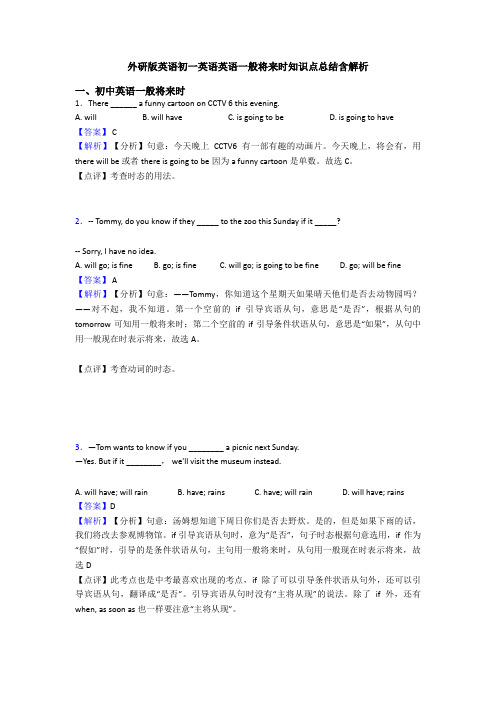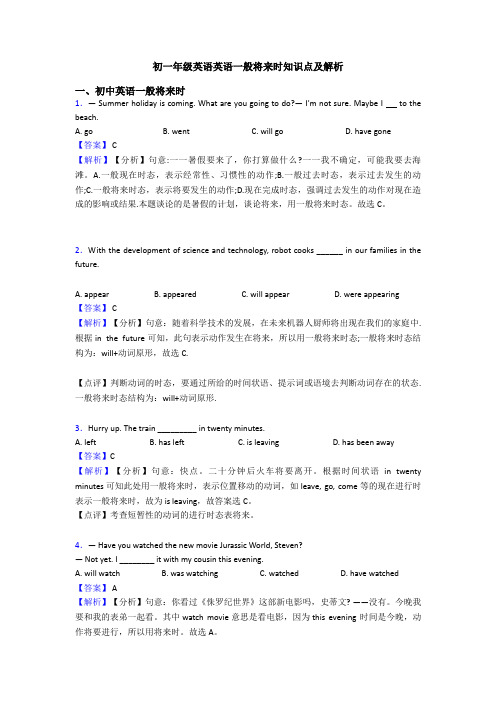外研版--初一英语---一般将来时
外研版英语初一英语英语一般将来时知识点总结含解析

外研版英语初一英语英语一般将来时知识点总结含解析一、初中英语一般将来时1.There ______ a funny cartoon on CCTV 6 this evening.A. willB. will haveC. is going to beD. is going to have【答案】 C【解析】【分析】句意:今天晚上CCTV6有一部有趣的动画片。
今天晚上,将会有,用there will be 或者there is going to be因为a funny cartoon是单数。
故选C。
【点评】考查时态的用法。
2.-- Tommy, do you know if they _____ to the zoo this Sunday if it _____?-- Sorry, I have no idea.A. will go; is fineB. go; is fineC. will go; is going to be fineD. go; will be fine【答案】 A【解析】【分析】句意:——Tommy,你知道这个星期天如果晴天他们是否去动物园吗?——对不起,我不知道。
第一个空前的if引导宾语从句,意思是“是否”,根据从句的tomorrow可知用一般将来时;第二个空前的if引导条件状语从句,意思是“如果”,从句中用一般现在时表示将来,故选A。
【点评】考查动词的时态。
3.—Tom wants to know if you ________ a picnic next Sunday.—Yes. But if it ________, we'll visit the museum instead.A. will have; will rainB. have; rainsC. have; will rainD. will have; rains 【答案】D【解析】【分析】句意:汤姆想知道下周日你们是否去野炊。
初中英语外研版七年级下册M3U3知识点讲解

七年级英语下册M3U3知识讲解【语法】语法:一般将来时(一)(1)一般将来时:表示自己打算做某事,计划做某事或有意做某事;或表示即将发生某事。
(2)结构:主语 + be going to + 动词原形 + 其它Eg: 肯定句:I am going to visit Beijing tomorrow.我明天要去参观北京。
否定句:I am not going to visit Beijing tomorrow.我明天不会去参观北京。
一般疑问句:Are you going to visit Beijing tomorrow?你明天回去参观北京吗?肯定回答:Yes, I am.否定回答:No, I’m not.特殊疑问句:What are you going to do tomorrow?你明天打算干什么?(3)时间标志词:in + 时间段; tomorrow, the day after tomorrow(后天);next ~; ina week等(4)there be的将来时结构为:There is/ are going to be + 名词 + 地点短语Eg: There is going to be a meeting next week.下周将会有一个会议。
【知识讲解】1.Listen to music 听音乐Eg: She likes listening to music.她喜欢听音乐。
2.Go shopping= do some shopping 去购物Eg: She often goes shopping with her mother on weekends.她经常周末和妈妈去购物。
3.Do some sports 做运动Eg: Many young people in the UK do some sports on Saturday morning.在英国许多年轻人在周六上午做运动。
新外研版初一英语下册各单元语法总练习(答案)

七年级下册重点语法Module1语法:名词性物主代词肯定句结构:主语+can+动词原形+其他.否定句结构:主语+can’t(cannot)+动词原形+其他.一般疑问句:把can提前肯定回答:Yes,主语+can.否定回答:No,主语+can’t.一、用can,can’t填空1.What______youdo?Icanliftthisbox,butI______liftthatheavychair.2.______hereadChinese?——No,he______readChinese,buthe______readEnglish.3.______youstandinfrontofthedoor?ThenI______seeyou.4.______Pennywashthedishes?Yes,she______.5.I______seesomespoons,butI______seeanyknives.6.______acatdrinkmilk?Yes,it______.1.表示计划到某地去,谓语动词go与going重复,一般只说begoingto+地点..2.begoingto表示自己打算做某事,计划做某事或有意做某事3.will则表示对未来的猜测一、单项选择()1.There__________ameetingtomorrowafternoon.A.willbegoingtoB.willgoingtobeC.isgoingtobeD.willgotobe()2.Charlie________herenextmonth.A.isn'tworkingB.doesn'tworkingC.isn'tgoingtoworkingD.won'twork()3.He________verybusythisweek,he________freenextweek.A.willbe;isB.is;isC.willbe;willbeD.is;willbe()4.There________adolphinshowinthezootomorrowevening.A.wasB.isgoingtohaveC.willhaveD.isgoingtobe()5.-_____you______freetomorrow?-No.I_____freethedayaftertomorrow.(leave).-What______you____________(do)afteryou_________(leave)here?-I___________(return)homeand___________(get)ajob.3.I______(be)tired.I_____________(go)tobedearlytonight.4.Mary'sbirthdayisnextMonday,hermother_______________(give)herapresent.5.Itisverycoldthesedays.It______________(snow)soon.6.-_______you__________(be)herethisSaturday?-No.I___________(visit)myteacher.7.-____________I______________(get)youacopyoftoday'snewspaper?-Thankyou.8.Iamafraidthere____________(be)ameetingthisafternoon.Ican'tjoinyou.9.Mike______________(believe,not)thisuntilhe_________(see)itwithhisowneyes.10.Mostofusdon'tthinktheirteam_____________(win).Module5语法:特殊疑问句(相当于特殊疑问词加一般疑问句)一whattime,whatcolor,whatday,what填空。
完整word版外研版英语七年级一般将来时

一般未来时一、定义表示未来某个时间要发生的动作,事情或存在的状态,也表示未来常常或频频发生的动作或事情。
常用的时间状语: tomorrow morning /afternoon/evening(明日早、中、晚 ),the day after tomorrow(后天 ),next year(明年 ) ,next month(下一个月 ) ,next week(下一个礼拜 ) , soon(不久 ) ,later on 过些时间, this afternoon(今日下午 ) , in+段时间( in 2020在 2020 年)............二、组成及变化一般未来常常用的两种构造:be going to+do : 表示打算、计划做某事或存心做某事。
shall/will+do :描绘未来的事情或表达对未来的展望等。
be going to will/ shall do 一定句主语 + be(am /,is,/ are) going to +主语 +will/shall+ 动词原形 +其动词原形 +其余它否认句主语 +be( am / is / are)其余主语 + will /shall+ not + 动词动词原形+原形 +其余not going to +一般疑问句Be (am / is / are)+主语will/shall+ 主语 +动词原形 +其+going to+动词原型 +其余 ?它?特别疑问句特别疑问词 (Wh-)+ 一般疑问特别疑问词 (Wh-) + 一般疑问句 ?句?三、 will 与 be going to 的差别1.be going to 表示依据主观判断未来一定发生的事情, will 表示客观大未来必然发生的事情。
E.g: I'm going to play football tomorrow afternoon.He will be twenty years old.2.be going to 含有“ 计划,准备”的意思,而 will 则没有这个意思。
外研版初一英语(下册)知识点归纳

MODULE 1一.短语归纳。
1. lost and found box 失物招领箱2.be careful with…小心…3. from now on 从现在开始4.(be) in a hurry 匆忙5. hundreds of 成百上千6.look for 寻找(过程)7. first of all 首先8.find 找到(结果)9. try to do sth 努力做某事(会成功)10.choose from 从…中挑选11.try doing sth 试图做某事(成功与否未知)12. at the moment 此时此刻13. such as 例如(用于列举)14. for example 例如二.重点句型结构1.Whose + 名词+is this ? 这是谁的…?2.help sb do sth. 帮助某人做某事3.Please be careful with…请小心保管…4.Welcome to + 地点欢迎来到…5.call sb at + 电话号码拨…给某人打电话三.语法专项。
物主代词:表示所属关系的代词(…属于谁的)人称单数复数形容词性物主代词名词性物主代词形容性物主代词名词性物主代词第一人称my mine our ours 第二人称your yours your yours第三人称his histheir Theirs her hersits its形容词性物主代词和名词性物主代词的关系:形容词性物主代词:必须和名词在一起。
My father, your teacher...物主代词名词性物主代词:相当于与之相对应的形容词性物主代词+名词。
This shirt is mine. =This is my shirt.MODULE 2一.短语归纳。
1. get on well with sb. 与某人相处融洽2.play the piano 弹钢琴3.play table tennis 打乒乓球4.what about…? =how about…?...怎么样?5.worry about…担心…6.be good at doing sth. 擅长做某事7.fly a kite 放风筝8.that’s all 仅此而已9.be ready to do sth. 乐于做某事二.重点句型结构。
初一年级英语英语一般将来时知识点及解析

初一年级英语英语一般将来时知识点及解析一、初中英语一般将来时1.— Summer holiday is coming. What are you going to do?— I'm not sure. Maybe I to the beach.A. goB. wentC. will goD. have gone【答案】 C【解析】【分析】句意:一一暑假要来了,你打算做什么?一一我不确定,可能我要去海滩。
A.一般现在时态,表示经常性、习惯性的动作;B.一般过去时态,表示过去发生的动作;C.一般将来时态,表示将要发生的动作;D.现在完成时态,强调过去发生的动作对现在造成的影响或结果.本题谈论的是暑假的计划,谈论将来,用一般将来时态。
故选C。
2.With the development of science and technology, robot cooks ______ in our families in the future.A. appearB. appearedC. will appearD. were appearing【答案】 C【解析】【分析】句意:随着科学技术的发展,在未来机器人厨师将出现在我们的家庭中. 根据in the future可知,此句表示动作发生在将来,所以用一般将来时态;一般将来时态结构为:will+动词原形,故选C.【点评】判断动词的时态,要通过所给的时间状语、提示词或语境去判断动词存在的状态. 一般将来时态结构为:will+动词原形.3.Hurry up. The train _________ in twenty minutes.A. leftB. has leftC. is leavingD. has been away【答案】C【解析】【分析】句意:快点。
二十分钟后火车将要离开。
根据时间状语in twenty minutes可知此处用一般将来时,表示位置移动的动词,如leave, go, come等的现在进行时表示一般将来时,故为is leaving,故答案选C。
外研版初一下英语课本全梳理(M4—M6)

外研版初一下英语课本全梳理(M4—M6)Module 4 Life in the future【短语归纳】1. in the future 将来2. study at home 在家学习3. in 20 year’s time 20年之后4. on the Internet 在网络上5. be able to 能、会6. free time 空闲时间7. come true 实现8. all year﹙around﹚整年9. as well 也﹙肯定句句末,前面无逗号﹚10. not… any more 不再…11. by email 通过电子12. ask a question 问问题13. the change of weather 天气的变化14. do light and easy work 做轻松简单的工作【重点句型结构】1. be able to +动词原形能/会做...2. not … any more 不再...Tony doesn′t play football any more.托尼不再踢球了。
3.not only…but also… 不仅…而且…Not only me but also he likes English. 不仅我他也喜欢英语。
(动词的形式与but also之后名词的数保持一致)【语法专项】一般将来时﹙Ⅱ﹚由shall和will引导的一般将来时1.含义:将会…2. 特点:助动词shall和will没有人称和数的变化,之后要加动词原形。
shall在一般将来时中,一般用于第一人称之后。
例如:I/We shall have an English lesson.我们将有一节英语课。
3.否定形式:shall not=shan′t will not=won′tModule 5 Shopping 【短语归纳】1. on Mother′s Day 在母亲节这一天2. what colour/color 什么颜色3. What about…? ...怎么样?4. try on 试穿5. look at… 看...6.too much 太多...(修饰不可数名词)7. wait a minute 等一会儿8. half price 半价9. pay for 为...付钱10. a few days later 几天后11. the price of… ...的价格12. one day 一天13. at any time 随时14. one of them 他们中的一个15. be able to 能/会...16. because of… 因为...17. online shopping 网络购物【重点句型结构】1.What′s the price of…? ...的价格是多少?2.buy sb sth. =buy sth for sb. 给某人买某物3.one of the+形容词最高级+可数名词复数最...之一one of the most famous writers 最著名的作家之一。
外研版初一英语时态专题复习

外研版初一英语下学期期末专题复习一、一般现在时:(1、现在的状态。
2、经常或习惯性动作。
3、主语所具备的性格和能力。
4、真理。
)1、标志:often(经常),usually(通常),sometimes(有时),always(总是),never(从不),on Sundays(在星期天), everyday/month/year(每一天/月/年) 2、结构:(1)主语+连系动词be(am/is/are)+名词/形容词/数词/介词短语/副词等做表语表状态(包括Therebe+n.)(2)主语(非第三人称单数)+行为动词原形+其他(用助动词do帮助构成否定句、一般疑问句和特殊疑问)(3)主语(第三人称单数)+行为动词的第三人称单数+其他(用助动词does 帮助构成否定句、一般疑问句和特殊疑问句)行为动词第三人称单数加-s的形式1. - s 2.辅音+y:study-studies3.以s,x,ch,sh结尾watch-watches teach-teaches 4.特殊have-has do-d oes go-goes练习1:用is、am或are填空1.China _________ a big country.2.We__________intheclassroom.3.Hermother _________ an Englishteacher.4.He ________a worker. He worksvery hard.5.Where_________youfrom?6.It _________ a beautiful cat.7.They_________good friends.8.I ________not from Jiangsu. Icome from Shanghai.练习2.用所给动词的正确形式填空。
1. Jimusually________ ( have ) lunch at home.2. Li Guanhua_______ (be) twenty years old.3. How many students________ (be) there inyourclass?4. ---______she_______ ( study )hard?---Yes, she _________.5.Lucy and lily_____________( not speak)Chinese.6.Myfather______________ ( not do)morning exercises every day. 7.Shealways___________(wash)her clothes on Sundays.8. ______ your brother________ ( like ) playing football? No, he____________.二.现在进行时:表示说话瞬间或现阶段正在进行的动作。
- 1、下载文档前请自行甄别文档内容的完整性,平台不提供额外的编辑、内容补充、找答案等附加服务。
- 2、"仅部分预览"的文档,不可在线预览部分如存在完整性等问题,可反馈申请退款(可完整预览的文档不适用该条件!)。
- 3、如文档侵犯您的权益,请联系客服反馈,我们会尽快为您处理(人工客服工作时间:9:00-18:30)。
一般将来时一般将来时表示将来某个时间要发生的动作,事情或存在的状态,也表示将来经常或反复发生的动作或事情1〕will/shall+动词原形 shall用于第一人称,常被will 所代替。
will 在陈述句中用于各人称,在征求意见时常用于第二人称。
will not=won't shall not=shan't例如:Which paragraph shall I read first?我先读哪一段呢?Will you be at home at seven this evening? 今晚七点回家好吗?2〕 be going to +不定式,表示将来。
a. 主语的意图,即将做某事。
例如:What are you going to do tomorrow? 明天打算作什么呢?b. 方案,安排要发生的事。
例如:The play is going to be produced next month。
这出戏下月开播。
c. 有迹象要发生的事。
例如:Look at the dark clouds, there is going to be a storm. 看那乌云,快要下雨了。
3〕 be +不定式表将来,按方案或正式安排将发生的事。
例如:We are to discuss the report next Saturday.我们下星期六讨论这份报告。
4〕 be about to +不定式,意为马上做某事。
例如:He is about to leave for Beijing. 他马上要去北京。
注意:be about to do 不能与tomorrow, next week 等表示明确将来时的时间状语连用。
Notice:be to和be going tobe to 表示客观安排或受人指示而做某事,be going to 表示主观的打算或方案。
例如:I am to play football tomorrow afternoon. 明天下午我去踢球。
〔客观安排〕I'm going to play football tomorrow afternoon. 明天下午我想去踢球。
〔主观安排〕5〕.现在进行时表将来时以下动词的现在进行时表示将来时go e.fly.leave.start.begin.finish.end.arrive and so on.she is leaving for Wuhan tomorrow.6〕.一般现在时表将来1〕以下动词come, go, arrive, leave, start, begin, return的一般现在时可以表示将来,主要用来表示在时间上已确定或安排好的事情。
例如:The train leaves at six tomorrow morning. 火车明天上午六点开。
When does the bus star? It stars in ten minutes. 汽车什么时候开?十分钟后。
2〕以here, there等开始的倒装句,表示动作正在进行。
例如:Here comes the bus. = The bus is coming. 车来了。
There goes the bell. = The bell is ringing. 铃响了。
3〕在时间或条件句中。
例如:When Bill comes 〔不是will come〕, ask him to wait for me. 比尔来后,让他等我。
I'll write to you as soon as I arrive there. 我到了那里,就写信给你。
4〕在动词hope, take care that, make sure that等的宾语从句中。
例如:I hope they have a nice time next week. 我希望他们下星期玩得开心。
Make sure that the windows are closed before you leave the room. 离开房间前,务必把窗户关了。
其时间状语有如下几种1〕this引导的短语如this year 2〕tomorrow 及其相关短语如tomorrow morning 3〕next引导的短语如next month 4) from now on ; in the future ; in an hour 等。
1)shall用于第一人称,可被will 所代替。
will 在陈述句中用于各人称,在争求意见时常用于第二人称。
Which paragraph shall I read first.Will you be at home at seven this evening?2)be going to +不定式,表示将来。
a. 主语的意图,即将做某事。
What are you going to do tomorrow?b. 方案,安排要发生的事。
The play is going to be produced next month。
c. 有迹象要发生的事Look at the dark clouds, there is going to be a storm.3)be +不定式表将来,按方案或正式安排将发生的事。
We are to discuss the report next Saturday.4)be about to +不定式,意为马上做某事。
He is about to leave for Beijing.注意:be about to 不能与tomorrow, next week 等表示明确将来时的时间状语连用。
注意:一、易无视动词用原形形式例:1 He will is (be) at school next Monday.2 He is going to does (do) his homework after school.答案:1 be 2 do解析:第一题有的同学一看he做主语就用了is,无视了will后应加动词原形。
我们在写句子时,很容易把动词丢掉,“英语句子里,动词不能少〞的规律必须要牢记。
第二题中to后加动词原形,而不是用单三人称.二、be going to +动词原形与will+动词原形用法不清楚例:我正努力学习,准备参加英语考试。
I am studying hard and I will try for my English exams.答案:I am studying hard and I am going to try for my English exams.解析:“be going to〞表示方案、打算要做某事。
E.g. He is going to visit his friends. 还表示某种迹象说明会发生某事.e.g. Look at the clouds. It’s going to rain. 而“Will+动词原形〞指对将来事物的预见、表示意愿、决心。
E.g. I will wait for you until you come. 在单纯预测未来时,二者可以互换,但在此题中只能用be going to,而不能用will。
一.单项选择()1. He _______ able to come on Friday because he fails in his exam.A. will be notB. will not beC. is going to beD. isn’t going be()2. – When ________ again?--When he ____________, I’ll let you know.A. he comes ;comesB. will he come;will comeC. he comes ;will he comeD. will he come;comes()3. Do you think Tom ______________ his uncle if he arrives?A. calledB. callsC. will callD. is calling()7. We ________ begin our lessons if you _________ ready.A. will ; will beB. shall ; Will getC. will ; getD. /; are()9. Your shirt is dirty.________ it for you?A. Am I going to washB. Will I washC. Am I washingD. Shall I wash()10. Look at these clouds, it _______________. A. will be raining B. is going to rain C. rains D. is to rain()11. It ______ hours to do the job. No, it won’t.A. has takenB. is takingC. will takeD. would take()12. If you don’t mind, I __________ off the TV set.A. will turnB. am turningC. would turnD. had turned()14. Shall I call a taxi for you?No, thanks. __________ one myselfA. I callB. I’ll callC. I’d callD. I called() 16. She ________ him a lovely dog on his next birthday.A. givesB. gaveC. will givingD. is going to give() 18. He ________ in four days.A. coming backB. came backC. will come backD. is going to coming back() 19. If it ________ tomorrow, we’ll have a picnic.A. isn’t rainB. won’t rainC. do esn’t rainD. doesn’t fine() 20. – Will his parents go to see the film tomorrow?No, ________.A. they shall not.B. they won’tC. they aren’t.D. they don’() 21. Who ________ we ________ swimming with tomorrow afternoon?A. will;goB. do;goC. wil ; goingD. shall ; go() 22. We ________ the homework this way next time.A. doB. will doC. going to doD. will doing() 23. Tomorrow he ________ a kite, and then ________ boating.A. will fly; will goB. will fly; goesC. is going to fly; will goesD. flies; will go() 24. The day after tomorrow he________ a volleyball match.A. will watchingB. watchesC. is watchingD. is going to watch () 25. There ________ a birthday party this Monday.A. shall beB. will beC. shall going to beD. will going() 26. There __________ a meeting tomorrow afternoon.A. will be going toB. will going to beC. is going to beD. will go to be() 27. President Washington ________ here next month.A. isn’t workingB. doesn’t workingC. isn’t going to workingD. won’t work() 28. He ________ very busy this week, he ________ free next week.A. will be ; isB. is ; isC. will be ; will beD. is ; will be() 30.–________ you ________ free tomorrow?– No. I ________ free the day after tomorrow.A. Are ; going to;willB. Are ; going to be;willC. Are ; going to;will beD. Are ; going to be;will be() 31.Mother ________ me an exciting present on my next birthday.A. will giveB. will giveC. givesD. give() 32.– Shall I buy a cup of tea for you?–________.A. No, you won’t.B. No, you aren’t.C. No, please don’t.D. No, please.() 33.– Where is the morning paper?– I ________ it for you at once.A. getB. am gettingC. to getD. will get() 34.________ a concert next Saturday?A. There will beB. Will there beC. There can beD. There are () 35 If they come, we ________ a meeting.A. haveB. will haveC. hadD. would have to be() 36. They ________ an English evening next Sunday.A.are havingB. are going to haveC. will havingD. is going to have () 37. ________ you ________ free next Sunday?A. Will ;areB. Will;beC. Do ;beD. Are ;be() 39. ________ your brother ________ a magazine from the library?A. Are;going to borrowB. Is;going to borrowC. Will;borrowsD. Are;going to borrows() 40. – Shall I come again tomorrow afternoon?–________.A. Yes, pleaseB. Yes, you willC. No, please.D. No, you won’t. () 41. It ________ the year of the horse next year.A. is going to beB. is going toC. will beD. will is() 42. ________ open the window?A.Will you pleaseB. Please will youC. You pleaseD. Do you() 44. It ________ us a long time to learn English well.A. takesB. will takeC. spendsD. will spend() 45. The train ________ at six o’clock.A. going to arriveB. will be arriveC. is going toD. is arriving一、单项选择2。
